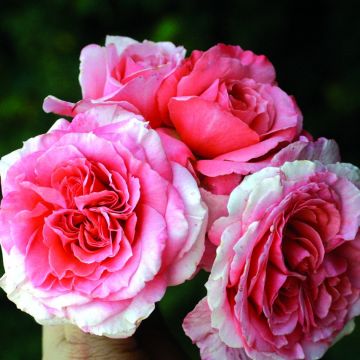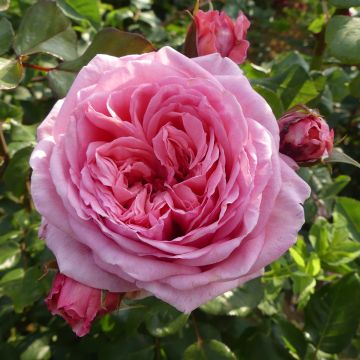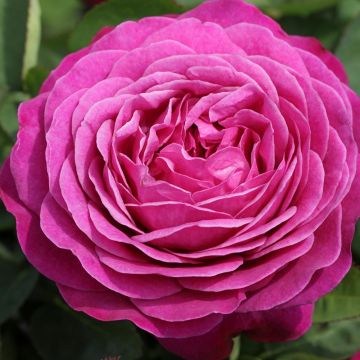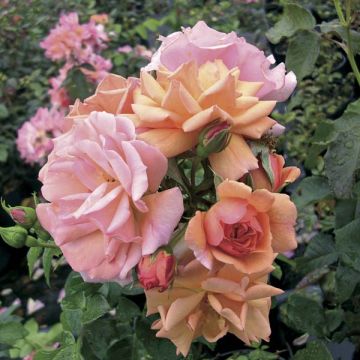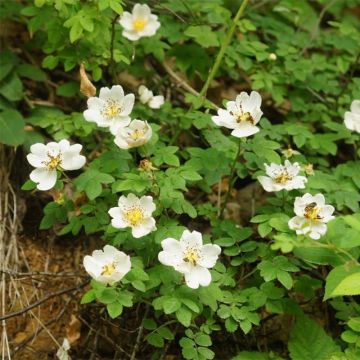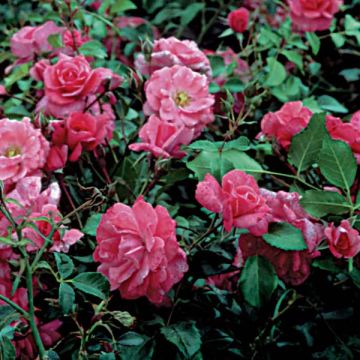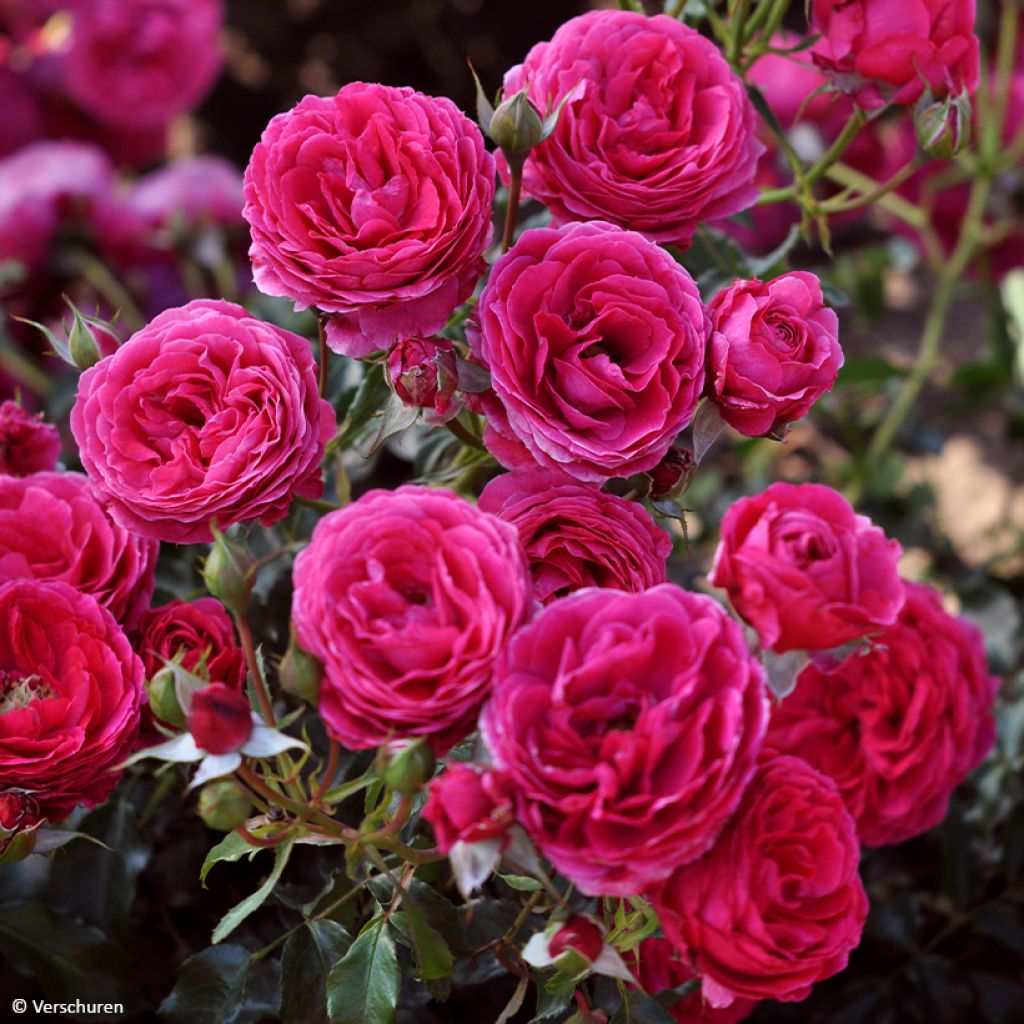

Rosa x floribunda Taste of Love 'Dolce' - Floribunda Rose
Rosa x floribunda Taste of Love 'Dolce' - Floribunda Rose
Rosa x floribunda Taste of Love® Dolce® 'BOZreka023'
BOZreka023
Edible petal rose not planted yet, but it won't be long. I can't wait to taste the petals.
Nath44, 17/05/2025
Special offer!
Receive a €20 voucher for any order over €90 (excluding delivery costs, credit notes, and plastic-free options)!
1- Add your favorite plants to your cart.
2- Once you have reached €90, confirm your order (you can even choose the delivery date!).
3- As soon as your order is shipped, you will receive an email containing your voucher code, valid for 3 months (90 days).
Your voucher is unique and can only be used once, for any order with a minimum value of €20, excluding delivery costs.
Can be combined with other current offers, non-divisible and non-refundable.
Home or relay delivery (depending on size and destination)
Schedule delivery date,
and select date in basket
This plant carries a 6 months recovery warranty
More information
We guarantee the quality of our plants for a full growing cycle, and will replace at our expense any plant that fails to recover under normal climatic and planting conditions.
Description
The Taste of Love 'Dolce' bush rose is desirable in more ways than one. Aesthetically, we are captivated by its numerous very double flowers, with an attractive bright pink colour against the glossy dark green foliage. From June to October, these beautiful flowers emit a pleasant fruity fragrance. Lastly, its petals, which are edible and flavorful, release a taste of redcurrant that works wonders in fruit salads and confectionery, as well as in jams and jellies. When we add its good disease resistance and exceptionally modest dimensions that even allow for container cultivation, it's impossible not to succumb to its charm...
The Dolce® variety 'BOZreka023' is part of the Taste of Love® collection, which brings together roses with edible petals that borrow their aroma from different fruits. The Rosa genus, which gave its name to the large Rosaceae family, is highly prolific in botanical species and horticultural developments. Classified into large groups, roses are thus enriched with a new range of sensations.
'Dolce' forms a small bush 40 to 50 cm (16 to 20in) in height and almost as wide. Its compound foliage, with a beautiful dark green colour and a glossy surface, is resistant to the typical diseases of roses, allowing it to provide a quality setting for its flowering. Very floriferous, this rose produces a multitude of medium-sized roses, approximately 6 cm (2in) in diameter, grouped in corymbs (bouquets) of 8 to 10 flowers, which bloom above the foliage. They catch the eye with their vivid colour, a pure and intense pink, which adorns about sixty petals. Very double, the corollas take on a seductive cup shape reminiscent of some old-fashioned roses.
This sun lover tolerates heat well, which helps spread its fruity fragrance, with citrus scents, in the air. Reblooming, the flowering covers the entire summer season, from June to mid-autumn, especially if faded flowers are removed to promote the emergence of new buds and if some watering is provided in dry weather. The excellent disease resistance of this variety makes organic cultivation easier by consuming its petals. Edible, they have a slight taste of redcurrant, although some may find hints of raspberries instead... it's up to each person to form their own opinion.
The edible rose Taste of Love 'Dolce' allows for creating a charming small bed, planted in small groups of 3 to 5 plants alongside other flowering plants, perennials, or bushes. To create strong contrasts, pair it with blue tones, such as those of Iris germanica Cascade Springs with its graphic flowers in two shades of blue. The Delphinium, available in different heights and with numerous varieties covering the entire range of blues, is one of the perennials that best complement roses. If you prefer softer colour combinations, opt for the variety Highlander Samba, with its tall white double flower spikes that will help you create a magnificent scene. The Pivoine lactiflora Solange, with its tousled rose-like flowers, will also be a perfect white companion.
In the kitchen:
Harvest the petals of flowers that are almost fully open but not wilted (they quickly lose their aroma), preferably in the morning. Only consume flowers from untreated plants. You can use them in confectionery to flavour jellies, jams, and fruit salads, prepare syrup, or even add flavour to drinks.
Report an error about the product description
Rosa x floribunda Taste of Love 'Dolce' - Floribunda Rose in pictures
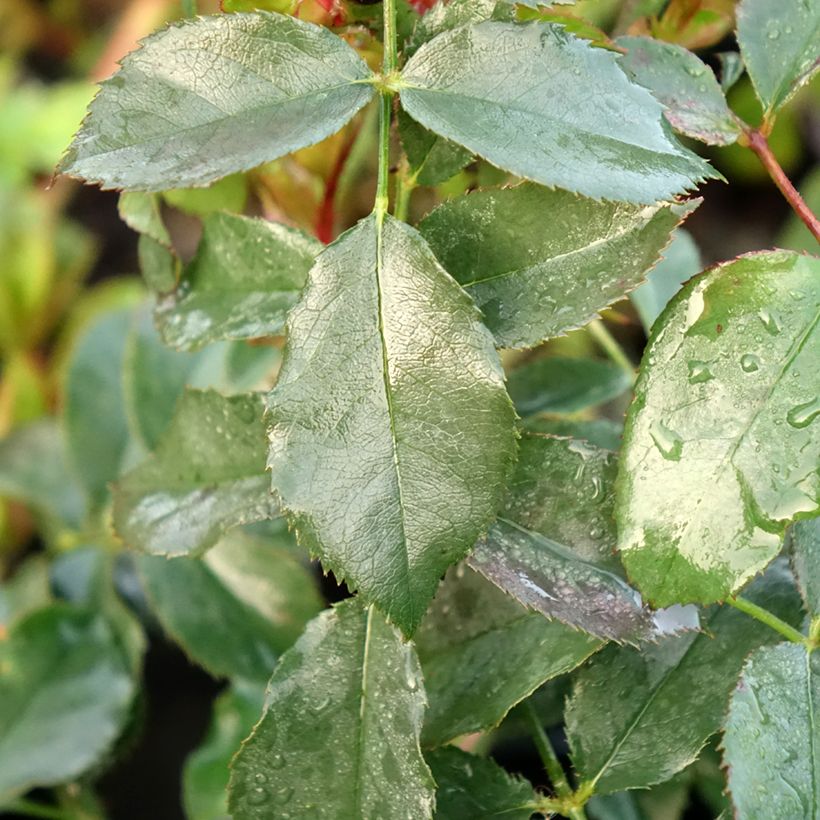

Plant habit
Flowering
Foliage
Botanical data
Rosa
x floribunda
Taste of Love® Dolce® 'BOZreka023'
Rosaceae
BOZreka023
Cultivar or hybrid
Planting and care
Plant your Taste of Love 'Dolce' Rose in a sunny position or light shade in a warm climate. Bedding roses are tolerant but won't appreciate excessive limestone or acidity. They adapt to any garden if the soil is well-worked and sufficiently rich. In excessively sandy, compacted, or dry soil in summer, it is preferable to add compost or well-rotted manure to the existing soil when planting. Soak the root ball in a bucket of water for fifteen minutes before planting, then place the rose in the planting hole, backfill around it, and water thoroughly. Then, provide regular watering during the first year, gradually reducing the frequency to encourage the roots to penetrate the soil.
Roses are hungry plants so that a specific fertiliser application will be beneficial at the start of growth and regularly throughout the flowering period. Preferably choose organic fertilisers richer in potash (the K in the NPK formula) than nitrogen (the N). As the flowers bloom, remove faded blooms to encourage the development of other buds.
Planting period
Intended location
Care
-
, onOrder confirmed
Reply from on Promesse de fleurs
Similar products
Haven't found what you were looking for?
Hardiness is the lowest winter temperature a plant can endure without suffering serious damage or even dying. However, hardiness is affected by location (a sheltered area, such as a patio), protection (winter cover) and soil type (hardiness is improved by well-drained soil).

Photo Sharing Terms & Conditions
In order to encourage gardeners to interact and share their experiences, Promesse de fleurs offers various media enabling content to be uploaded onto its Site - in particular via the ‘Photo sharing’ module.
The User agrees to refrain from:
- Posting any content that is illegal, prejudicial, insulting, racist, inciteful to hatred, revisionist, contrary to public decency, that infringes on privacy or on the privacy rights of third parties, in particular the publicity rights of persons and goods, intellectual property rights, or the right to privacy.
- Submitting content on behalf of a third party;
- Impersonate the identity of a third party and/or publish any personal information about a third party;
In general, the User undertakes to refrain from any unethical behaviour.
All Content (in particular text, comments, files, images, photos, videos, creative works, etc.), which may be subject to property or intellectual property rights, image or other private rights, shall remain the property of the User, subject to the limited rights granted by the terms of the licence granted by Promesse de fleurs as stated below. Users are at liberty to publish or not to publish such Content on the Site, notably via the ‘Photo Sharing’ facility, and accept that this Content shall be made public and freely accessible, notably on the Internet.
Users further acknowledge, undertake to have ,and guarantee that they hold all necessary rights and permissions to publish such material on the Site, in particular with regard to the legislation in force pertaining to any privacy, property, intellectual property, image, or contractual rights, or rights of any other nature. By publishing such Content on the Site, Users acknowledge accepting full liability as publishers of the Content within the meaning of the law, and grant Promesse de fleurs, free of charge, an inclusive, worldwide licence for the said Content for the entire duration of its publication, including all reproduction, representation, up/downloading, displaying, performing, transmission, and storage rights.
Users also grant permission for their name to be linked to the Content and accept that this link may not always be made available.
By engaging in posting material, Users consent to their Content becoming automatically accessible on the Internet, in particular on other sites and/or blogs and/or web pages of the Promesse de fleurs site, including in particular social pages and the Promesse de fleurs catalogue.
Users may secure the removal of entrusted content free of charge by issuing a simple request via our contact form.
The flowering period indicated on our website applies to countries and regions located in USDA zone 8 (France, the United Kingdom, Ireland, the Netherlands, etc.)
It will vary according to where you live:
- In zones 9 to 10 (Italy, Spain, Greece, etc.), flowering will occur about 2 to 4 weeks earlier.
- In zones 6 to 7 (Germany, Poland, Slovenia, and lower mountainous regions), flowering will be delayed by 2 to 3 weeks.
- In zone 5 (Central Europe, Scandinavia), blooming will be delayed by 3 to 5 weeks.
In temperate climates, pruning of spring-flowering shrubs (forsythia, spireas, etc.) should be done just after flowering.
Pruning of summer-flowering shrubs (Indian Lilac, Perovskia, etc.) can be done in winter or spring.
In cold regions as well as with frost-sensitive plants, avoid pruning too early when severe frosts may still occur.
The planting period indicated on our website applies to countries and regions located in USDA zone 8 (France, United Kingdom, Ireland, Netherlands).
It will vary according to where you live:
- In Mediterranean zones (Marseille, Madrid, Milan, etc.), autumn and winter are the best planting periods.
- In continental zones (Strasbourg, Munich, Vienna, etc.), delay planting by 2 to 3 weeks in spring and bring it forward by 2 to 4 weeks in autumn.
- In mountainous regions (the Alps, Pyrenees, Carpathians, etc.), it is best to plant in late spring (May-June) or late summer (August-September).
The harvesting period indicated on our website applies to countries and regions in USDA zone 8 (France, England, Ireland, the Netherlands).
In colder areas (Scandinavia, Poland, Austria...) fruit and vegetable harvests are likely to be delayed by 3-4 weeks.
In warmer areas (Italy, Spain, Greece, etc.), harvesting will probably take place earlier, depending on weather conditions.
The sowing periods indicated on our website apply to countries and regions within USDA Zone 8 (France, UK, Ireland, Netherlands).
In colder areas (Scandinavia, Poland, Austria...), delay any outdoor sowing by 3-4 weeks, or sow under glass.
In warmer climes (Italy, Spain, Greece, etc.), bring outdoor sowing forward by a few weeks.































